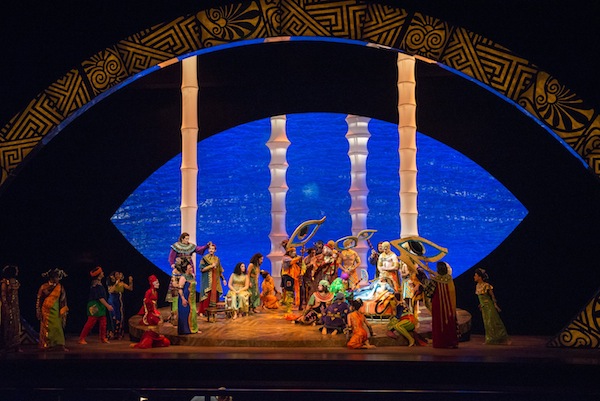
Infatuated with Thaïs
By Sebastian Spreng, Visual Artist and Classical Music Writer
The orchestral and melodic sumptuousness of Jules Massenet’s craft cannot disguise the fact that Thaïs is a derivative work by the composer of Manon and Werther; a typical product of an era when Orientalism invaded Paris and left its mark on the visual and decorative arts as well as on innumerable exotic operas. Those operas, often varnished with rampant Wagnerism – another epidemic of the times – fell into oblivion. Because of their uneven musical values and outmoded theatricality, operas like Lakme, Salammbô, Phryne and The Pearl Fishers are seldom staged today, and only remembered for a lone aria or duo.
Infatuated with California-born soprano Sybil Sanderson, his favorite Manon, for whom six years earlier he had composed the stratospheric Esclarmonde, Massenet wrote Thaïs when the diva was at the beginning of her decline. Sybil was a beauty addicted to alcohol and morphine and died of liver cancer at only 38. In fact, there are obvious parallelisms between the composer’s crush on Sanderson and Athanaël’s infatuation with the courtesan of Alexandria. Athanaël is a masochistic monk who disguises his repression with exasperating fanaticism, a variant of Tannhäuser resisting the call of Venus in a melodrama framed by Wagnerian orchestration and French syrup. Thaïs survived thanks to the entrancing Meditation for violin in the second-act intermission and the exquisite aria Dis moi que je suis belle, an operatic version of Snow White’s “Mirror, mirror on the wall” that concludes with a treacherous but optional high note, a headache for the soprano who dares to try it.
But no opera can sustain an entire production by virtue of one aria – otherwise great material for a recital or encore – and in spite of its musical beauties Thaïs is no exception. It’s an obsolete work unless the stage director undertakes a radical makeover, a turn of the screw connected to current events or justified by monumental, top-quality staging. Force majeure compelled Florida Grand Opera to cancel Tristan and Isolde, but what’s disconcerting is its decision to pick Thaïs to wrap up the season, there being so many more attractive choices in the operatic repertoire.
Already in 1926, a New York critic called it “a musical desert whose only oases are the meditation and an aria.” As to the lead, the ill-fated Sanderson was succeeded by such glamorous pre-war prima donnas as Mary Garden (1907), Geraldine Farrar (1917) and Maria Jeritza (1922), at the Met and other opera houses, including Buenos Aires’ Teatro Colón, with the divine Ninon Vallin in 1918 and 1924. For good or ill, the debacle of World War II swept away the remains of that world, taking Thaïs with it. The femme-fatale-become-saint returned to the Met in 1978 as a vehicle for a declining Beverly Sills and three decades later for Renée Fleming a decade after having first recorded it with Thomas Hampson, who also played her Athanaël onstage.
In her debut as the eponymous heroine, the much-admired Cuban-American soprano Eglise Gutiérrez brought to the role a darker timbre than usual, a deep understanding of the character and her entire battery of resources at the service of the Renaud Doucet-André Barbe team’s choreographic staging; a multi-colored extravaganza capped by outlandish costumes that included Klimt-like designs and one or two gratuitous details pour épater les bourgeois. Intentionally kitschy as obsessive in their multiple mirrors illustrating “the Eye of God”, this over-the-top approach also showed the influence of Wieland Wagner’s sets in the first and last scenes.
In the pit, the excellence of conductor Ramón Tebar and an orchestra that keeps improving against all odds lent appropriate luster and polish to Massenet’s music, providing a rich and urgent reading, with no indulgences or mannerisms, that added to the effectiveness of a cast of young talents in which the Uruguayan tenor Martin Nusspaumer stood out in the role of Nicias, as did bass Adam Lau, another name to follow. For his part, Canadian Kristopher Irmiter’s Athanaël brought intensity and volume to one of the most thankless, demanding roles for his range in the French repertoire. They were appropriately supported by the rest of the cast and the choir under the direction of Michael Sakir.
Beyond the hits and the misses, and even though it’s difficult to avoid being caught in the seductive honey of the Meditation, the choice of Thaïs leaves unanswered questions.
*THAÏS – FLORIDA GRAND OPERA – May 3, 4, 6, 10, 15, 17 – Miami – Fort Lauderdale
www.fgo.org – 1-800-741-1010 Photo by Justin Namon
Recent Content
-
Artsarticle ·
-
Artsarticle ·
-
Artsarticle ·
